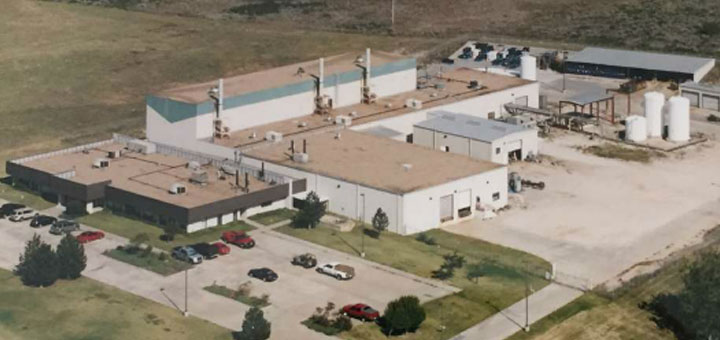Deepwater Chemicals
The Experts in Iodine Chemistry
Business View Magazine profiles Deepwater Chemicals for a second time. They are the leading manufacturer of iodine-based specialty chemicals in Oklahoma.
Deepwater Chemicals, a subsidiary of Toyota Tsusho Corp, based in Woodward, Oklahoma is a manufacturer of specialized organic and inorganic iodine derivatives. Iodine is a chemical element of the halogen family with an atomic number of 53. It exists in nature as a lustrous, purple-black, metallic solid that, when boiled, sublimes into the light purple-colored gas, from which it gets its name – ioeidēs is Greek for violet. It was first discovered by the French chemist, Bernard Courtois, in 1811.
Because of its atomic structure, iodine reacts strongly with many other chemicals to form multifarious compounds and substances with a wide array of applications. Iodide salts were first employed, medically, in the early 1900s as a treatment for a host of conditions, including metal poisoning, asthma, aneurisms, gout, syphilis, nephritis, and bronchitis. Tincture of iodine was used as a pre-operative, skin sterilization before surgery. In the human body, Iodine is an essential element for life, required for the synthesis of the body’s growth-regulating hormones. A deficiency of iodine can result in a variety of diseases and infirmities.
Today, the major uses of organic iodine compounds are as: catalysts; disinfectants; food supplements; stabilizers; dyes, colorants, and pigments; medicines and pharmaceuticals; and various uses in analytical chemistry. Inorganic iodides find specialized applications – silver iodide is not only a major ingredient of photographic film, it is used to seed clouds to induce rain. Radioactive isotopes of iodine are used to treat thyroid cancer.
Iodine is found on Earth mainly as the highly water-soluble iodide: ion I-, which concentrates in oceans and brine pools. Of the several places in which iodine occurs, only two sources are useful commercially: the caliche, a sedimentary rock, found in Chile, and the iodine-containing brines of gas and oil fields, especially in Japan and the United States. The first iodine production in the United States occurred when it was harvested from seaweed off the coast of California between 1917 and 1921.
Getting iodine from brine is how Deepwater Chemicals, itself, got started. In 1931, the original company, Deepwater Iodides, began recovering iodine from the brine associated with the oil and gas drilling operations in the Long Beach area on California’s southern coast. In the 1970s, the company started making iodine derivatives – 50 different iodine-based chemicals went into animal feed and other commodity products. In the early 1990’s, Deepwater Iodides moved to Oklahoma to be nearer to the Morrow Formation, an underground sandstone of iodine-rich brine some 7,000 feet below the earth’s surface located in Woodward and Dewey counties.
From its 44,000 square foot, state-of-the-art facility, six miles from the town of Woodward, Deepwater Chemicals manufactures a portfolio of over 20 specific iodine derivatives with multiple variants. In many instances, its clients have come to the company with a need for a particular compound and Deepwater, after applying its expertise in iodine chemistry, has created, manufactured, and, often scaled-up a custom-designed derivative that solved a particular problem or maybe even became a brand a new product.
Last October, Business View Magazine spoke to Steve Wachnowsky, Vice President and General Manager of Deepwater, President, Nick Shimbo and Sales Manager, Pamela Curry. We checked in with them, recently, to see what this innovative and dynamic company has been up to over the past year.
Curry reports that since we last spoke, Deepwater has continued to focus on expanding the business through product portfolio extension, new product development, and penetration into diverse niche markets. “To do that, we’ve expanded our sales and marketing capabilities by adding two new people to our staff for outside sales,” she says. “And we are focusing on our expertise in iodine chemistry to secure new business.”
Wachnowsky elaborates upon Deepwater’s expertise by explaining that the company is a cGMP manufacturer. cGMP refers to the current Good Manufacturing Practice regulations and guidelines enforced by the U.S. Food and Drug Administration (FDA). cGMPs provide for systems that establish documented evidence which provides assurance that a process will consistently produce a product meeting its pre-determined specifications and quality attributes through proper design, monitoring and control. We are leveraging that capability,” he says, “as a long-standing iodine derivative manufacturing company that operates under cGMP, and we’re registered with the FDA for both drug and food products.”
Wachnowsky cites a specific example of how Deepwater is extending its product portfolio: “Several years ago melamine was discovered in some pet food.” (Melamine is a white, crystalline compound that is mostly used in making plastics.) “This resulted in real problems – the pet food poisoned a lot of dogs and cats. As a result, in 2011 the US Congress passed the Food Modernization Safety Act (FSMA), which requires higher levels of raw material traceability, and the required pet food and animal feed producers to meet the same requirements as food and pharmaceutical producers do. One of the things that Deepwater can provide, being a cGMP and a FDA registered facility, is FSMA compliance for our process and traceability of our products. We have three qualified iodine supply sources from three different regions of the world that are tracked. We can guarantee the traceability of our iodine sources as well as other materials used in our process back to the ground. This is the important point we stress with new customers as the advantage of doing business with Deepwater Chemicals.”
Deepwater is also going to invest a new pilot plant that Wachnowsky says is going to give the company greater R & D and process development capabilities. “If there’s a new product that someone wants us to do, right now, our smallest reactor is 500 gallons. It’s very difficult to do process development when someone says, ‘How small a batch can you make?’ People don’t want 500 gallons, so we’re putting 50 gallon reactors in. And in a scale-up situation, if you go ten to one, it works pretty well. The other thing that it will do – the Sales Team gets a lot of requests for small-quantity, iodine derivative products. And we’re getting a lot of requests for high-purity products. Those tend to be smaller volumes, so we’ll be able to utilize that pilot plant for the production of small-volume, high-purity products. Our goal is to have the plot plant operational in first quarter 2017.”
Wachnowsky also stresses Deepwater’s commitment to its current clients and customers in the niche market that iodine chemistry is important to. “We’ve actually developed and introduced an improved product quality for one our business segments that is leading to increased performance for customers,” he says, citing an example. “We had a large customer come to us and say, ‘Could you do this?’ And we said, ‘Well, let’s see.’ And over the last six months, we developed an extended, higher-quality product that is ending up in a better performance for them. And that is exactly what we want to do.”
Finally, Deepwater does a small amount of toll blending. Toll blending is a specialty service whereby companies with complex chemical formulations have their batches mixed and processed into a final product. Tolling allows a company with a unique formula to send its materials and process information to a specialized company, like Deepwater, for production, packaging, and in some cases, final delivery. “We have two, large Hastelloy Reactors,” Wachnowsky says. “Hastelloy is a very high alloy steel that we’re looking for opportunities to utilize for those tolling opportunities that would require cGMP reactive chemistries, beyond blending, where we can add value to their business.”
Adding knowledge-based value to the planet’s naturally-occurring iodine for the benefit of its customers and the world at large is precisely what Deepwater Chemicals has been doing for decades. “Our expertise is iodine chemistry,” Wachnowsky says, summing up. “We’re working with those people who value the time, efforts, and the resources we put into helping them develop a new product. There are very few that do what we do. I won’t say we’re the only, but there are very few. So it does set us apart.”
Read Business View Magazine’s first feature profiling Deepwater Chemicals, Inc., published in 2015
Check out this handpicked feature on Rea Magnet Wire – We power the world.
AT A GLANCE
WHO: Deepwater Chemicals, Inc.
WHAT: Leading manufacturer of iodine-based specialty chemicals
WHERE: Woodward, Oklahoma
WEBSITE: www.deepwaterchemicals.com
PREFERRED VENDORS
FedEx – FedEx Corporation is a multinational courier delivery services company headquartered in Memphis, Tennessee, with a total of 12 air hubs in the company’s worldwide network. It was founded in 1971 by Fred Smith, and installed its first drop box in 1975 which allowed customers to drop off packages without going to a company local branch. The name “FedEx” is a syllabic abbreviation of the name of the company’s original air division, Federal Express, which was used from 1973 until 2000. The company is known for its overnight shipping service, but also for pioneering a system that could track packages and provide real-time updates on package location, a feature that has now been implemented by most other carrier services. FedEx Express operates one of the largest civil aircraft fleets in the world and the largest fleet of wide bodied civil aircraft; it also carries more freight than any other airline. – www.fedex.com
DIG DIGITAL?


